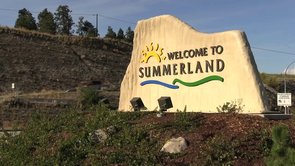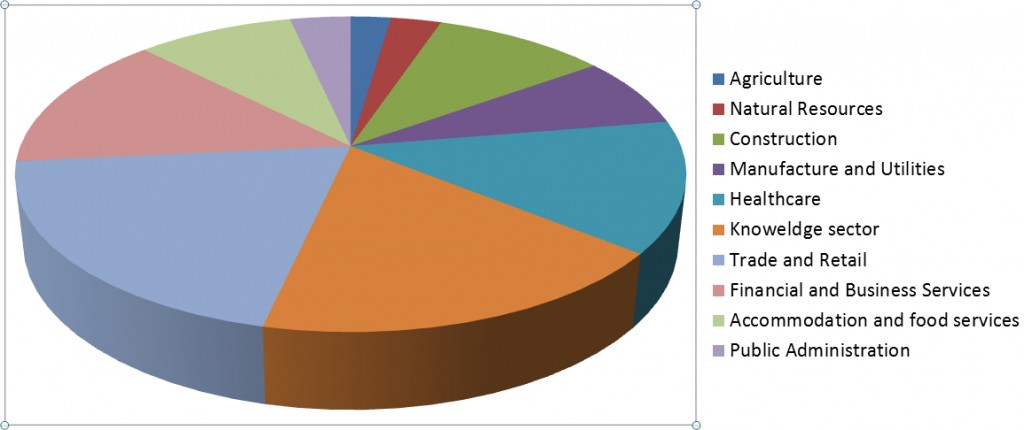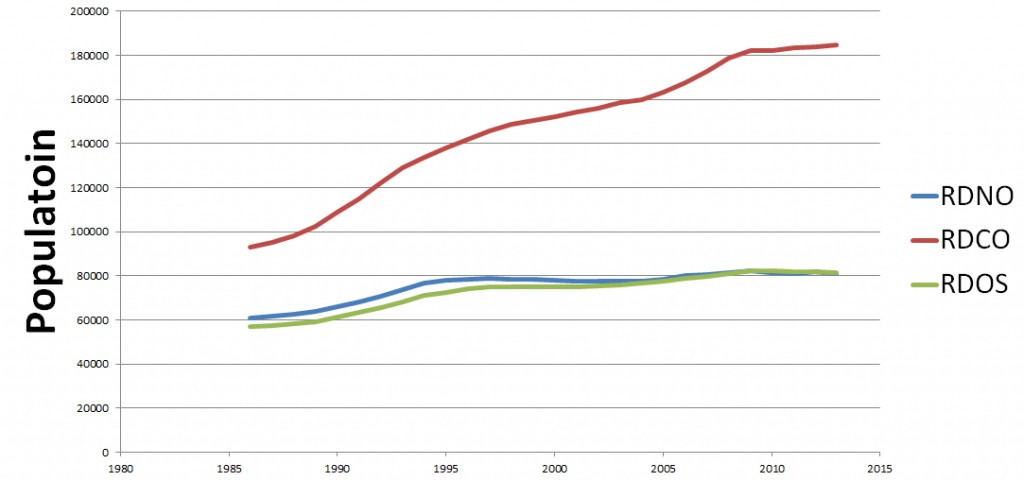A proposed land swap in Summerland has been in the news of late (Global News). Town council is proposing to remove 80 hectares of agricultural land near the town and replace it with some arguably less productive land slightly larger farther away from town. The town argues that it needs to grow to expand. It further argues that developing closer to the core reduces sprawl, saves on infrastructure costs relative to growth further away, etc.
But why should Summerland grow at all?
The economy here in the Okanagan depends on growth. The figure below plots data from BC Stats on the Okanagan Economy in 2012. Construction, and large shares of Trade and Retail, and Financial and Business Services (which includes legal services and real estate) relate to bringing new people to the Okanagan. When we stop building new homes and businesses and selling those to newcomers, people loose jobs and struggle to make ends meet. But does it have to be this way?
The Okanagan will continue to grow. It will continue to attract people because of its lifestyle and climate. However, does that mean we have to spread this growth around to all the communities in the Okanagan. Why should Summerland (or Osoyoos or Oliver or Armstrong) grow at the same rate as Kelowna or Vernon? Is it possible that some parts of the Okanagan, some communities, have enough people already, and that it is better to concentrate the growth somewhere else?
I think that politics is a big part of this. More numbers from BC Stats show how the population of the three regional districts in the Okanagan have changed over the last three decades. In the early 80’s, the Central Okanagan already had the largest population of the three regional districts. That wasn’t true thirty years earlier, before the first bridge. Going forward to the present, and the Central Okanagan has more people than both other regional districts combined.
Why does population matter? Kelowna is big, busy, congested, noisy and at times downright unpleasant compared to Penticton. It is in such a state that the premier is looking to help by building a second bridge across the lake. But this is the rub. Because Kelowna is big, it gets more money from the provincial government. It has a bigger market, so business finds it a more attractive place to be. Given how our water rights system works too, as Kelowna grows, its claim to the scarce Okanagan water also grows. That is the consequence of a first in time, first in right system of water rights with a use it or loose it provision. From a political perspective, from an ability to secure resources and exert influence, communities that don’t grow get left behind.
So back to the question, should Summerland grow? Listening to some of the proponents of the land swap, Summerland must grow. Should Summerland grow isn’t even a question they are considering. Maybe it should be. Maybe we should be looking at the Okanagan as a whole and deciding where the best place to accommodate more people is. Maybe some parts of the Okanagan are already ‘full’ and should not grow. I won’t answer the question for Summerland, but I will pose it, and I hope that there are people willing to seriously consider it. Of course, that also means we have to learn to work together for the good of the valley as a whole, not just for ourselves or those in our neighbourhood.




 Follow
Follow
The question shouldn’t be whether should Summerland grow. It should be HOW should Summerland grow. There are many areas of prime developable land near the downtown core that are either vacant or underutilized. A proper review of economic/demographic trends would likely reveal there is sufficient residential land for many years to come. More critical for economic development is working land – agricultural and industrial – to provide jobs and a stronger tax base. Residential property taxes are a pittance compared to taxes from businesses. And as many will point out, it is the quality of life that draws many to the Okanagan to work and live. Retaining orchards near town boosts the local charm and encourages people to choose the smaller communities over Kelowna.